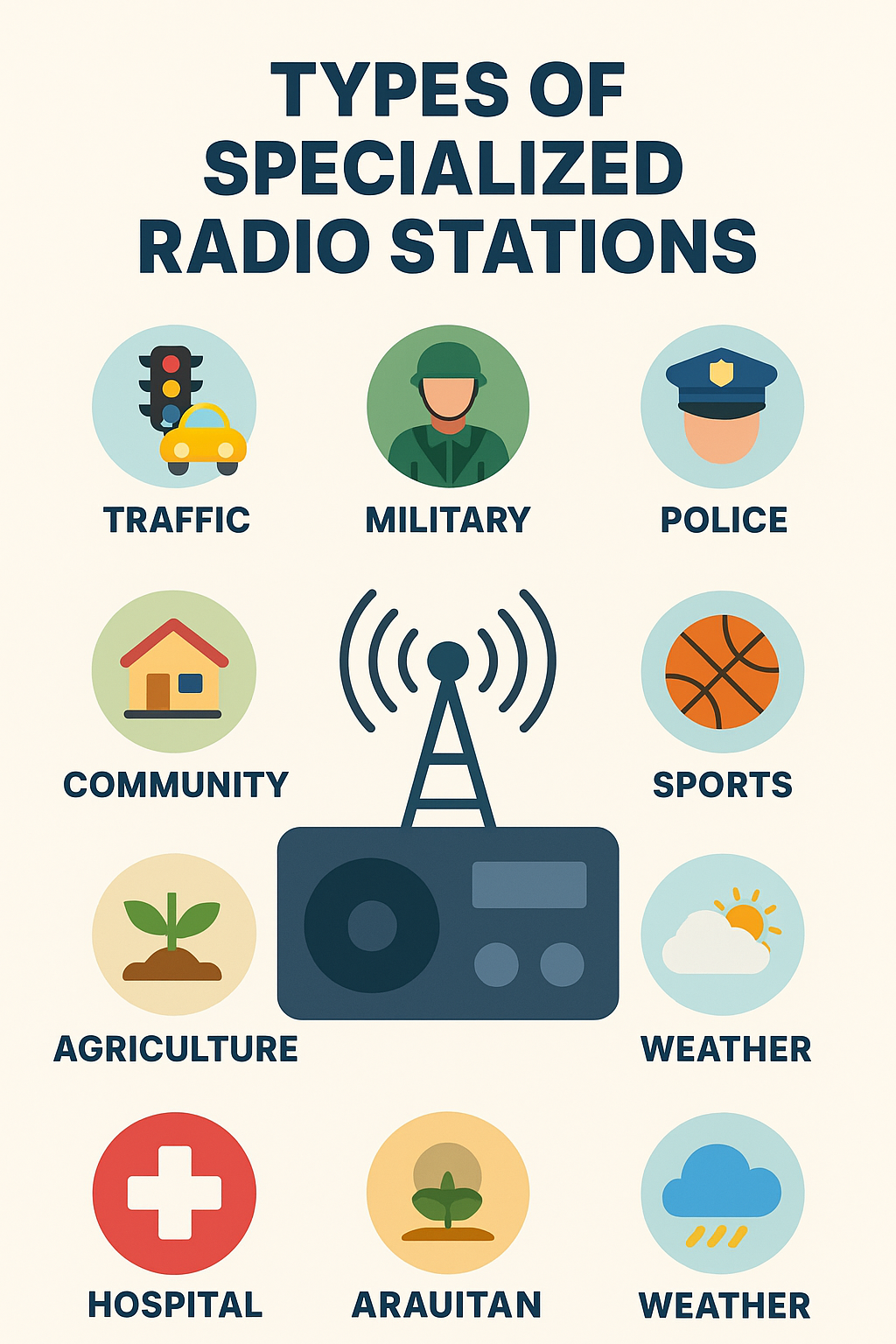Types of Specialised Radio Stations: From Traffic Radio to Hospital Radio
Introduction
Radio remains one of the most powerful communication tools in the world. Beyond music and entertainment, some radio stations are built for particular audiences or purposes. These are called specialised radio stations (also known as niche radio or format radio). They play a unique role in public service, security, education, health, and community development.
In this post, we’ll explore the most common types of specialised radio stations, their functions, and why they are important today.
1. Traffic Radio
Traffic radio stations provide real-time traffic updates, road safety tips, and navigation advice. They are especially useful in big cities with high congestion.
- Audience: Drivers, commuters, logistics companies
- Purpose: Reduce traffic jams, improve road safety
- Example: Lagos Traffic Radio 96.1 FM (Nigeria)
2. Military Radio
Military radio stations are operated by the armed forces to communicate with troops, share security updates, and build morale.
- Audience: Military personnel and their families
- Purpose: Defence information, training, public relations
- Example: Armed Forces Radio, Nigeria
Read also: Affordable Equipment to Start a Radio Station in Nigeria (2025 Guide)
3. Police Radio
Police radio stations focus on law enforcement, security awareness, and community policing.
- Audience: General public & police force
- Purpose: Crime prevention tips, community relations, public announcements
- Example: Nigeria Police Radio 99.1 FM
4. Sports Radio
Sports radio is fully dedicated to football, athletics, and other sports news. It is one of the most popular specialised radio types worldwide.
- Audience: Sports fans and athletes
- Purpose: Live commentary, sports news, analysis, interviews
- Example: Brila FM (Nigeria’s first sports radio station)
5. Weather Radio
Weather radio provides weather forecasts, climate updates, and natural disaster alerts.
- Audience: Farmers, travellers, coastal communities
- Purpose: Disaster prevention, climate awareness
- Example: NOAA Weather Radio (USA)
Read also: The Future of Radio Broadcasting in Nigeria’s Digital Era
6. Hospital Radio
Hospital radio stations are designed to entertain and inform patients within hospitals.
- Audience: Patients, hospital staff, caregivers
- Purpose: Reduce stress, provide health education, offer entertainment
- Example: Many teaching hospitals in the UK and Africa are adopting hospital radio to improve patient care.
7. Campus/University Radio
Students or universities run campus radio stations to educate, entertain, and train young broadcasters.
- Audience: Students, lecturers, youth community
- Purpose: Media training, information sharing, youth culture promotion
- Example: Unilag 103.1 FM (University of Lagos, Nigeria), & BUK FM (Bayero University Kano)
8. Community Radio
Community radio stations are owned and managed by local communities. They broadcast in local languages and address community issues.
- Audience: Residents
- Purpose: Promote culture, education, local governance, and health awareness
- Example: Dala FM, Kano (community-focused content)
Read also: Radio vs Podcast: Which Works Better for Nigerian Audiences?
9. Religious Radio
Religious stations focus on faith-based content, prayers, and teachings.
- Audience: Faith communities
- Purpose: Spiritual growth, religious education
- Example: Radio Maria, Radio Islam International
10. Agricultural Radio
Agricultural radio provides farming tips, weather forecasts, and market information.
- Audience: Farmers, rural communities
- Purpose: Improve food production and empower farmers
- Example: Farm Radio International programs across Africa
11. Children’s Radio
Children’s radio stations focus on educational and entertaining content for kids.
- Audience: Children & parents
- Purpose: Education, storytelling, cultural values
- Example: Children’s Radio Foundation (Africa
Read also: What You Need to Start Online Radio Streaming (Beginner’s Guide)
12. Emergency Radio
Emergency radio stations provide alerts during natural disasters, epidemics, or national crises.
- Audience: The Entire population during emergencies
- Purpose: Save lives, provide urgent updates
- Example: Emergency FM setups during Ebola and COVID-19 outbreaks
Why Specialised Radio Stations Matter
Specialised radio stations fill critical communication gaps by focusing on specific needs. They:
- Improve public safety (traffic, police, emergency)
- Enhance community development (agriculture, community, campus)
- Provide targeted entertainment and education (sports, hospital, children’s radio)
- Strengthen national institutions (military, government radio)
Conclusion
From traffic updates to hospital entertainment, specialised radio stations are proof that radio is not just about music—it is about meeting people where they are with the information they need most.
As Nigeria and other countries expand digital and FM broadcasting, these niche stations will continue to grow in importance.





